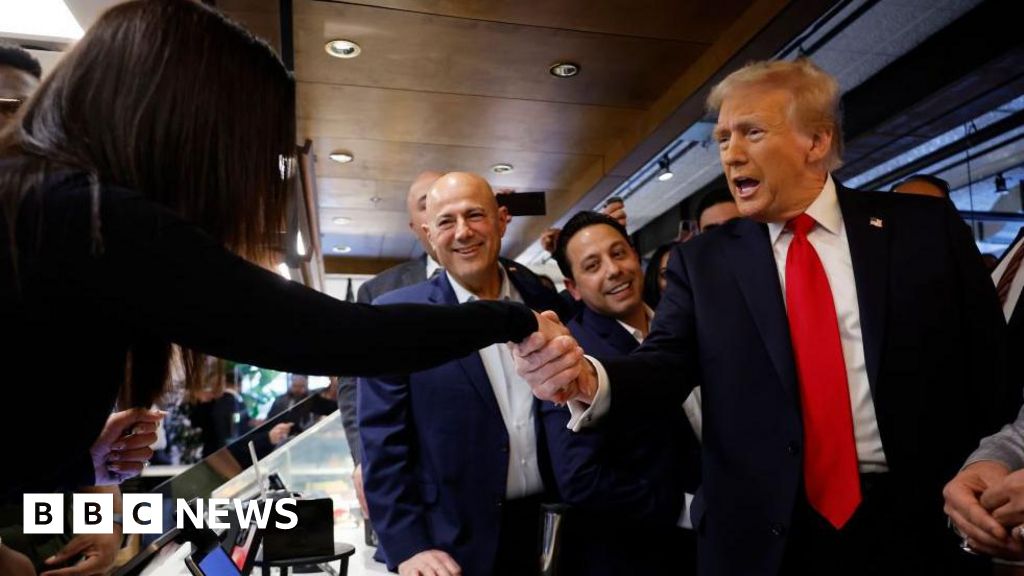On a sunny, crisp day in the US‘s largest Arab-majority town, dozens of people gathered in front of the Great Commoner Cafe to catch a glimpse at Donald Trump.
“What we want, is peace,” Trump said to a group Arab-American business leaders in a Dearborn, Michigan restaurant, days before the presidential elections.
A crowd of Trump supporters and Trump opponents shouting at each other nearby showed how divided Michigan has become in choosing the best American President to handle the escalating Middle East conflict.
The Republican’s visit to Dearborn on Friday, which was once a firmly Democratic area, is the culmination of efforts to court the more than 200,000 Arab-Americans living in Michigan, a state that must be won. It could swing a race between Trump and Kamala. Hillary Clinton lost Michigan by only 10,000 votes to Trump in 2016, but Biden won back the state by 150,000 votes by 2020.
The Trump campaign has been claiming that he is “for peace” and pro-Israel in the Middle East on billboards along Michigan highways, as well as during visits.
Some people have responded positively to that message. Trump received two endorsements from the Mayors of Dearborn Heights and Hamtramck – a small Muslim majority town near Detroit. Dearborn Mayor Abdullah Hammoud declined to meet with the former President.
Abbas Alawieh is concerned about the trend. He is one of the leaders in the Uncommitted movement, a group that protests US support for Israel. Alawieh pledged to support Harris even though her group refused to endorse Harris.
“I’ve heard… more of a feeling that this is a simple choice and some voters feel like we should just vote Donald Trump because he says he’s pro-peace,” Mr Alawieh said to the BBC on Friday at Haraz Cafe, in Dearborn.
The Harris campaign said that the vice president has supported and continues to support the “diverse Muslim communities” in the US.
“The Vice-President is committed to working to earn every vote, to unite our nation, and to be President for all Americans,” Nasrina Borgzie, campaign director at Muslim and Arab American Outreach, said. She added that Harris will ensure the community is “free from the hateful Trump administration policies”.
Despite their frustration with the Biden/Harris administration’s handling of the conflict, several community leaders told BBC that they do not believe Trump offers any solution.
Rexhinaldo Nazarko is the executive director of American Muslim Engagement and Empowerment Network in Michigan, an advocacy group for Muslims. He cited Trump’s 2017 executive order banning travelers from predominantly Muslim nations.
Mr Nazarko, along with other leaders, said that sending a message of their anger about the Biden-Harris Administration’s pro Israel policies was more important than whose win the White House.
They have encouraged voters to vote for third-party candidates or to just sit out the election.
Hassan Abdel Salam is a former Democrat and leader of the Abandon Harris Campaign. He delivered this message to a room full of people gathered at the American Muslim Center, Dearborn, for Friday’s prayer.
“Our intention is that we punish someone, a leadership who for a whole year we protested, we gave ultimata and warnings,” said he. “Our belief, even though we lived under Trump, who is a truly vile individual, was that we now saw that there was no lesser evil.”
Muslim leaders and political analysts acknowledge that the Harris Campaign has decided to focus on securing more moderate voters and improving voter turnout in traditionally Democratic regions like Detroit, instead of courting Muslims and Arab Americans.
Saeed Khan, professor at Wayne State University, said that the campaign is also concerned about losing support among pro-Israel Jewish and other Democrats who are more likely to vote.
Mr Khan said that many voters who were considering voting for third-party candidates will likely end up voting for Harris in order to keep Trump from office.
Wael Alzayat hopes Michigan voters will make this calculation, as CEO of the Muslim voter outreach group Emgage.
“A vote for Trump is a vote for a third-party, which will have the worst outcome,” said he. “Trump is like a brick wall.”
Mohammad Hassan is a member of Hamtramck’s fully Muslim City Council. He said that 80 percent of the 25,000 strong Bangladeshi Muslim Community will vote for Harris. The rest may go for Trump.
He said that not all Muslims are necessarily in agreement.
He said that “Yemeni Muslims living in the same city could be split 50-50 between Trump or Harris.”
Mr Hassan said that the anger in the Arab-Muslim communities over Gaza was real, but unlike the Bangladeshi Community, they did not vote in large numbers. “So even if they don’t vote for Harris, it is unlikely that their vote will go to Trump.”
Mr Khan said that many Arab Americans and Muslims want a “balanced narrative”, including more empathy for Gazans and Lebanese suffering.
He said that Harris’s remarks about the 100 or so [Israeli] hostages and the 45,000 to 50,000 Gazans who were killed was “egregious”.
According to the Hamas health ministry, over 43,000 people have died in Gaza since Israel began a campaign against Hamas following the group’s attack on October 20, 2023. Around 1,200 people were murdered and 251 other hostages were taken in the attack.
Mr Alawieh said that none of this makes it easy to support Harris.
He said that her campaign made a mistake in not bending on Israel. This may also cost her the support of young Democratic voters or voters from other races.
Mr Alawieh stated, “It seems to me that the Harris campaign in Michigan left many votes on the table.” “I hope that they’re doing this as part of a calculation that she will win. I hope we don’t look at her campaign after the election and say, “Maybe we shouldn’t have left those voters on the table.”
Read More @ www.bbc.com













